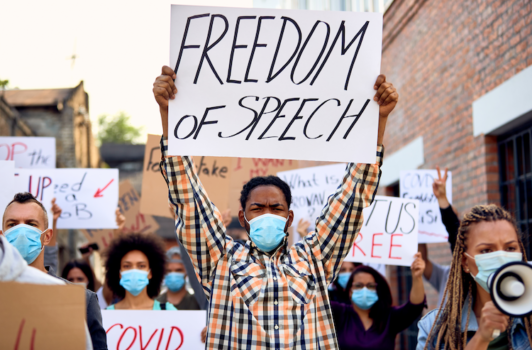
The Supreme Court of New Jersey recently heard oral arguments in Usachenok v. State of New Jersey Department of the Treasury. The case challenges a regulation that requests that state employees involved in discrimination investigations maintain its confidentiality. While the regulation was amended in 2020 to address free speech concerns, the plaintiff maintains that the regulation is still unconstitutional.
Facts of the Case
Plaintiff Viktoriya Usachenok, a former employee of the Department of the Treasury, filed an internal complaint with the Equal Employment Opportunity and Affirmative Action (EEO/AA) office in the Department of the Treasury, alleging that her supervisor sexually harassed her and subjected her to a hostile work environment. At that time, N.J.A.C. 4A:7-3.1(j) included a confidentiality directive not to discuss any aspect of the investigation with others. It stated: “All persons interviewed, including witnesses, shall be directed not to discuss any aspect of the investigation with others in light of the important privacy interests of all concerned. Failure to comply with this confidentiality directive may result in administrative and/or disciplinary action, up to and including termination of employment.”
Usachenok subsequently filed suit. During the pendency of the action, the Civil Service Commission (CSC) amended the regulation to state that investigators would “request” confidentiality and to remove the threat of disciplinary action for non-compliance. Despite the amendment, Usachenok contends that N.J.A.C. 4A:7-3.1(j) creates an unconstitutional prior restraint of state employees’ First Amendment right to freedom of speech and violates the legislative policies behind the New Jersey Law Against Discrimination (LAD).
Appellate Division’s Decision
The Appellate Division rejected the constitutional challenge. It held that the current version of the regulation is enforceable.
According to the Appellate Division, the context of the revised regulation demonstrates that the term “request,” as used in paragraph (j), is a request and not a command. Thus, it does not create a confidentiality requirement. “In fact, we know, as expressed by the CSC, the intent behind the amended regulation was to eliminate a confidentiality requirement and its potential chilling effect rather than create one.”
The Appellate Division also found that the amended regulation supports, rather than contravenes, the policies behind the LAD. “A request for confidentiality promotes a fair investigatory process that protects both the accuser and the accused while respecting the free-speech rights of all participating in an investigation,” the appeals court explained.
Issues Before the NJ Supreme Court
The New Jersey Supreme Court granted certification on May 9, 2023. The justices agreed to consider the following question:
Does N.J.A.C. 4A:7-3.1(j), a civil service regulation governing investigations of discrimination that, as amended in 2020, directs investigators to “request that all persons interviewed, including witnesses, not discuss any aspect of the investigation with others, unless there is a legitimate business reason,” impermissibly restrict protected speech in violation of the First Amendment or the New Jersey Law Against Discrimination?
The Court heard oral arguments on January 3, 2024. Several justices seemed skeptical regarding whether the amended regulation went far enough to remove free speech concerns. “Shouldn’t the request to give up one’s right to speak freely be accompanied by comments that you do not have to, that you have a right not to, that you are not going to be punished if you chose to speak?” asked Chief Justice Stuart Rabner.
Justice Rachel Wainer Apter also raised questions, asking: “If the intention all along in 2020 was that we are completely changing our policy, that we recognize that it harmed victims by telling them that they could not speak and there was a gag order against them and that they would be fired, perhaps, even if they talked to a lawyer or went to the EEOC or DCR to file a complaint of discrimination … how do you square that with the history in this case of the CSC continuing to say this is required?”
